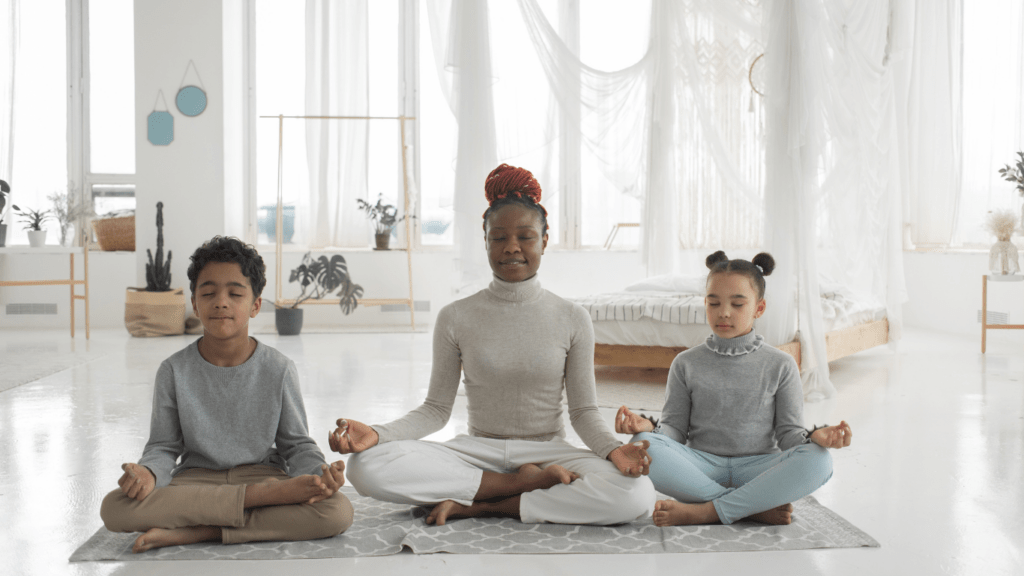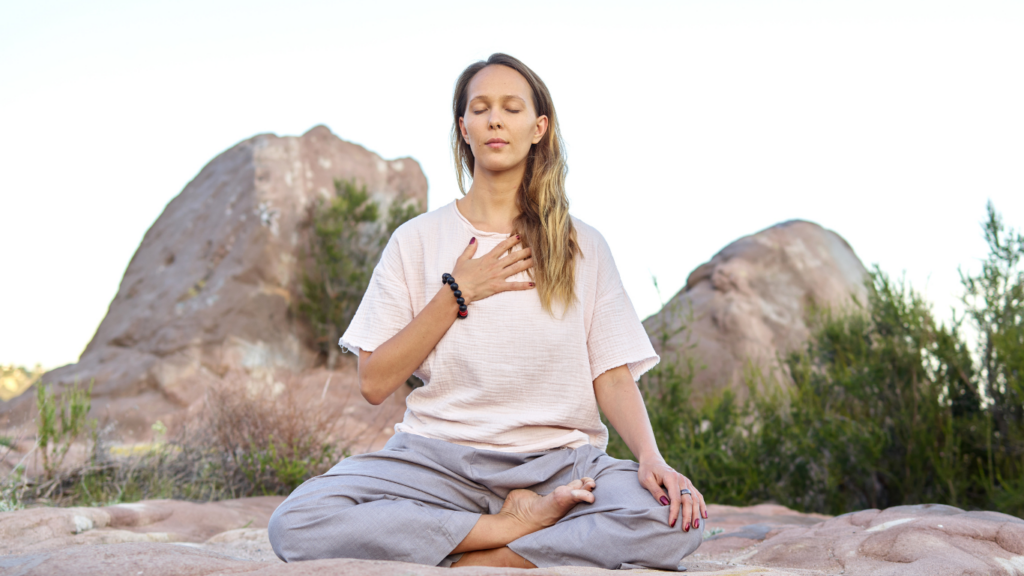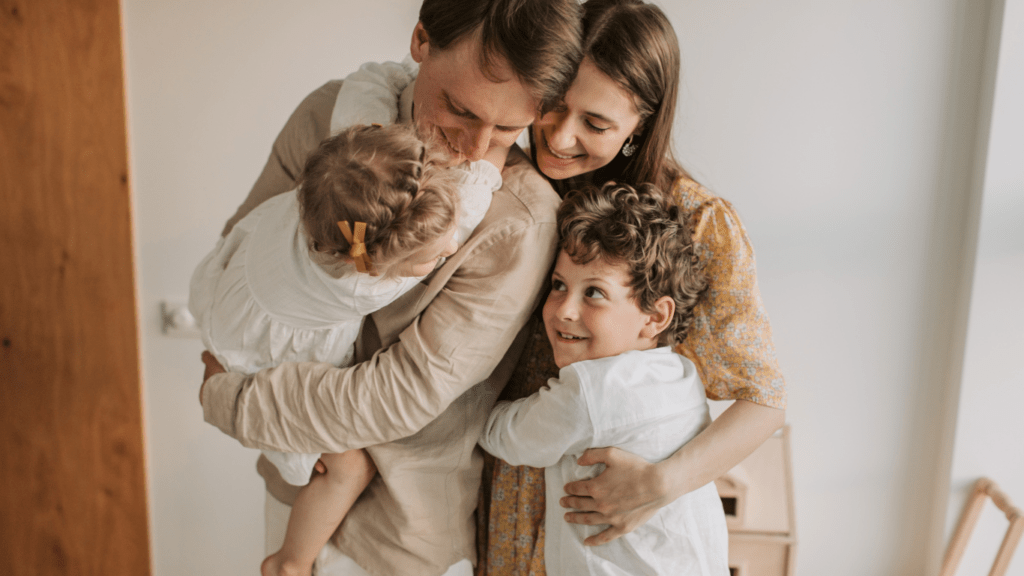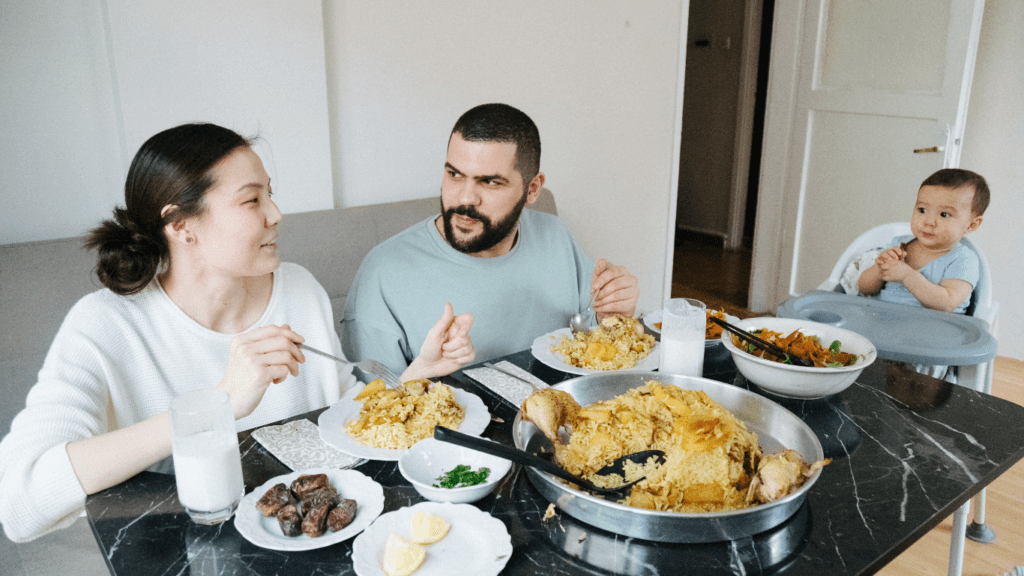The Importance of Self-Care for Parents
Self-care is vital for any parent navigating daily responsibilities. It’s common to feel overwhelmed by the demands of work and family. However, taking time for self-care activities like yoga and meditation can significantly improve your mental and physical health.
Enhancing Mental Clarity And Emotional Stability
Yoga and meditation encourage mindfulness, which can help you stay focused and present. These practices reduce stress and promote emotional stability, helping you manage parenting with more patience and understanding. For instance, practicing deep breathing exercises can quickly alleviate anxiety, giving you a calm mindset to handle unexpected challenges. According to the American Psychological Association, mindfulness reduces stress and improves mood.
Boosting Physical Health
Physical health benefits are just as crucial. Yoga stretches and strengthens muscles, improving flexibility and reducing aches and pains common in parenting. Additionally, regular physical activity can boost your energy levels, making it easier to keep up with your children. The Centers for Disease Control and Prevention highlight that regular physical activity improves overall well-being and reduces the risk of chronic diseases.
Fostering Better Relationships
By investing in self-care, you’re also fostering healthier relationships with your family. When you feel good, it positively impacts your interactions. Your emotional and physical well-being directly influences how you communicate and connect with your children and partner. Daily meditation sessions can enhance your empathy and patience, making family interactions more harmonious.
Offering Personal Time
Finding moments for yourself is important for recharging. Yoga and meditation provide personal space away from daily stressors. Even a few minutes of meditation can create a significant shift in your mood and outlook. The National Institute of Mental Health suggests that even short breaks for self-care can reduce stress and improve mental clarity.
By prioritizing self-care, you’re not only improving your well-being but also setting a positive example for your children.
Benefits of Yoga for Parents
Yoga can profoundly impact parents by addressing both physical and mental aspects of health.
Physical Health Benefits
Yoga enhances physical well-being, making it easier to handle parenting tasks. Improved flexibility allows for more comfortable movement when playing with children. Strength-building poses, including planks and warrior poses, aid in muscle development. Regular practice reduces the risk of injuries by increasing overall body awareness. Enhanced posture from yoga helps prevent back pain, a common issue for parents lifting children frequently.
Mental Health Benefits
Yoga significantly benefits mental health, providing a sanctuary from daily stresses. It promotes mindfulness, which helps parents stay present with their children. Stress reduction techniques, like deep breathing and meditation, lower anxiety levels. Consistent yoga practice improves mental clarity and decision-making skills. Increased emotional resilience allows parents to handle tantrums and challenges with greater patience and understanding.
Benefits of Meditation for Parents

Meditation offers several advantages for parents, improving both emotional well-being and family dynamics. Consistent and mindful practice can lead to significant benefits.
Stress Reduction
Meditation significantly reduces stress by promoting relaxation and calming the mind. Daily meditation helps release built-up tension from work and family responsibilities. Studies show that meditation lowers cortisol levels, mitigating the impact of stress on physical and mental health. For instance, parents practicing meditation report feeling more at ease, capable of handling daily challenges with a clearer mind.
Improved Focus and Patience
- Meditation enhances focus and patience, essential traits for effective parenting.
- By focusing on breathing and mindfulness, parents can train their minds to stay present.
- This increased focus aids in managing multitasking demands, from work obligations to family needs.
- Meditation strengthens patience.
- Parents who meditate regularly find themselves more capable of handling tantrums and conflicts calmly, leading to a more harmonious household environment.
Combining Yoga and Meditation in Daily Routine
Balancing a busy schedule becomes simpler by integrating yoga and meditation into daily life. Parents can find moments to recharge physically and mentally by following structured practices.
Morning Practices
Starting the day with yoga and meditation sets a positive tone. I recommend practicing a short morning routine to boost energy and clarity. Begin with 10 minutes of gentle stretches like:
- Child’s Pose
- Cat-Cow
- Downward-Facing Dog
Follow this with five minutes of deep breathing exercises or a guided meditation session to center your mind before the day’s activities.
Evening Practices
Wind down the day with relaxing yoga poses and meditation. Evening sessions help alleviate the day’s stress and prepare the mind for restful sleep. Spend 10-15 minutes on poses like Forward Bend, Legs-Up-The-Wall, and Reclining Bound Angle Pose. Conclude with a five-minute gratitude meditation focusing on positive aspects of the day and releasing tensions from the body and mind. This routine ensures a peaceful end to the day, promoting overall well-being.
Tips for Getting Started
Integrating yoga and meditation into a busy schedule might seem daunting, but taking small steps can help make it more manageable. Below are some practical tips to get started effectively.
Setting Realistic Goals
Focus on setting achievable goals to avoid feeling overwhelmed. Start with just 5-10 minutes of yoga or meditation each day. Gradually increase the duration as you become more comfortable. Consistency is more important than duration, and even short sessions can deliver significant benefits. For example, practicing deep breathing for five minutes each morning can significantly improve mental clarity.
Creating a Peaceful Space
Designate a specific area in your home for your practice to create a calming environment. Keep this space clutter-free and add elements like candles, cushions, or soothing music to enhance relaxation. If space is limited, a corner or even a specific mat can serve as a dedicated zone for your practice. This personal sanctuary helps signal to your mind and body that it’s time to relax and focus, making it easier to transition into your routine.



 Jordan Lamond – Family Travel Expert As the Family Travel Expert at Makes Parenting Watch, Jordan Lamond is passionate about helping families explore the world together while making travel as seamless and enjoyable as possible. With a background in tourism and a decade of personal experience traveling with his own family, Jordan offers firsthand insights into the challenges and rewards of family travel. He covers everything from selecting family-friendly destinations to packing essentials, travel safety, and navigating long flights or road trips with young children. Jordan’s mission is to empower parents to embark on travel adventures that strengthen family bonds, create lasting memories, and expose children to new cultures and experiences. His expert advice has helped countless families plan stress-free vacations, and his travel guides are some of the most popular resources on the site. Jordan also regularly reviews travel products and services, ensuring parents are equipped with the best tools for successful trips.
Jordan Lamond – Family Travel Expert As the Family Travel Expert at Makes Parenting Watch, Jordan Lamond is passionate about helping families explore the world together while making travel as seamless and enjoyable as possible. With a background in tourism and a decade of personal experience traveling with his own family, Jordan offers firsthand insights into the challenges and rewards of family travel. He covers everything from selecting family-friendly destinations to packing essentials, travel safety, and navigating long flights or road trips with young children. Jordan’s mission is to empower parents to embark on travel adventures that strengthen family bonds, create lasting memories, and expose children to new cultures and experiences. His expert advice has helped countless families plan stress-free vacations, and his travel guides are some of the most popular resources on the site. Jordan also regularly reviews travel products and services, ensuring parents are equipped with the best tools for successful trips.
